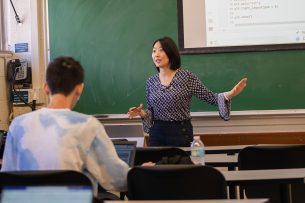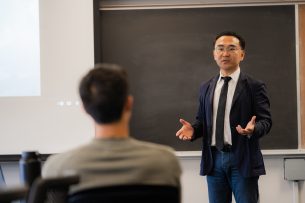
The Hollywood writers and actors strike has dominated the news this summer. The use — or misuse — of generative artificial intelligence lies at the heart of the matter. SAG-AFTRA and the Writers Guild of America are demanding that their contracts include AI regulations to protect writers, their creativity and…
Read moreGHQ, the University of Florida College of Journalism and Communications (UFCJC) multi-platform “radio station,” is partnering with Futuri Media to use Futuri’s RadioGPT™ AI technology, making GHQ one of the first radio stations in the world to use this service to better connect to audiences. RadioGPT™ uses Futuri’s TopicPulse system…
Read more
Linjuan Rita Men, University of Florida College of Journalism and Communications (UFCJC) Public Relations professor and director of Internal Communication Research, is the co-author of “The Power of AI-Enabled Chatbots as an Organizational Social Media Listening Tool,” a chapter in the new book Organizations Listening for Strategic Communication: Building Theory…
Read more
Research Fridays features faculty and graduate students from the University of Florida College of Journalism and Communications presenting current research to their colleagues. On April 7, 2023, Advertising Assistant Professor Won-Ki Moon presented “Rise of Non-Human Agents in (Strategic) Communication.”
Read more
By Lenore Devore, B.S. Journalism 1984 Advertising Associate Professor in Artificial Intelligence Yang Feng has focused her research in two areas: using machine learning to analyze a large amount of data related to ad campaigns, and exploring the role of social media algorithms in shaping consumer opinions. The goal is…
Read more
The term “fake news” and its connotations took hold of the country during Donald Trump’s presidency. Still, the proliferation of unchecked journalism and false reporting has led to adopting AI tools to wade through the mess. This begs the question, do online users trust AI to weed out fake news?…
Read more
Seungahn Nah’s curiosity hooked him on the path of research and took him from an internship in South Korea’s National Assembly in the mid-1990s to pursue academia in the United States. “I enjoy being curious about something new,” said Nah, a Journalism professor, the inaugural Dianne Snedaker Chair in Media…
Read more
Imagine a common, if not daily, experience in today’s online society: you’re scrolling through a website and ping a chat box pops up, stating “How can I help you today?” Organizations are adopting these live-chat systems that employ either human agents or AI-driven conversational agents. How consumers perceive these live-chat…
Read more
Many brands incorporate gender-related or political topics into their social media campaigns to stimulate conversation and engagement. However, consumer opinions are volatile, and a controversial campaign risks backlash. By using artificial intelligence (AI) to automate the analysis of consumer responses to social campaigns, brands can better understand consumer values and…
Read more
Artificial intelligence (AI) is projected to reshape the global economy. Automation technology is already permeating a broad spectrum of industries worldwide. Because of this, legislation has been enacted in Europe and the United States regulating the use of AI to ensure trustworthy use in both public and private sectors. As…
Read more
Most consumers today are confronted with algorithmic-based recommendations based on their past usage or buying history. But how do consumers actually feel about machines recommending media or goods they might like? A new study by Won-Ki Moon, University of Florida College of Journalism and Communications Advertising assistant professor, and colleagues…
Read more
A new study has found that when users perceive an artificial Intelligence (AI) system to be a helper, their frustration level lowers and their trust in the system increases. The findings by Won-Ki Moon, University of Florida College of Journalism and Communications Advertising assistant professor, and a team of researchers…
Read more